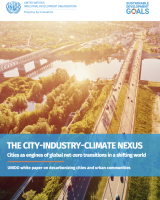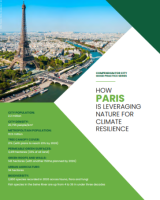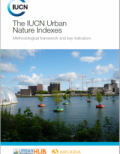Knowledge Products
The GPSC hosts a digital library featuring practical tools, reports, and case studies. Explore curated resources across thematic areas, filtering by topic or region to find the insights required to advance urban sustainability.
Featured Resource

By 2050, almost two-thirds of the world’s population will live in cities, which already consume most of the world’s energy and emit the majority of greenhouse gases. This makes urban areas central to both the causes of climate change and the solutions. The white paper argues that decarbonizing cities is not only environmental policy, but a strategic industrial agenda. It introduces the “city-industry-climate nexus,” where infrastructure, production systems, value chains, and climate action converge. Cities host the industries that supply

Compendium for City Good Practice Series: How Paris Is Leveraging Nature For Climate Resilience
This report, as part of the Compendium for City Good Practice series, highlights Paris's innovative approach to climate resilience through the strategic integration of nature into urban environments. It offers a comprehensive overview of Paris's strategy on urban nature, showcasing how the city is integrating biodiversity into planning, leveraging green spaces, biodiversity corridors, and sustainable landscaping to mitigate the impacts of climate change. The report serves as a valuable resource for cities worldwide seeking to emulate Paris's successful model of
All Knowledge resources
Explore the GPSC’s constantly growing library of knowledge resources, curated from cities across the world.

30x30 A Guide to Inclusive, Equitable and Effective Implementation of Target 3
This guide is about how to plan and implement the new global target for effectively and equitably conserving at least

Nature-Based Solutions for Cities
We are living in the urban century, one where urbanization is driving multiple global environmental changes that in turn place

Urban Flood Risk Handbook: Assessing Risk and Identifying Interventions
This Urban Flood Risk Handbook: Assessing Risk and Identifying Interventions is a roadmap for conducting an urban flood risk assessment

Integrating Gender and Social Inclusion in Nature-Based Solutions: Guidance Note
Nature-based solutions (NBS) have gained traction in recent years because of their potential to promote sustainable development and reduce disaster

As part of a series of publications to help financial institutions understand the relevance and implications of the Kunming-Montreal Global

Making Cities Green, Resilient, and Inclusive in a Changing Climate
Globally, 70 percent of greenhouse gas emissions emanate from cities. At the same time, cities are being hit increasingly by

The IUCN Urban Alliance, a broad coalition of IUCN constituents concerned with the urban dimensions of nature conservation, has unveiled

In the face of unprecedented biodiversity loss, 196 countries adopted in December 2022 the Kunming-Montreal Global Biodiversity Framework (GBF) providing

This report was first published before the final decision on the Global Biodiversity Framework was made at the CBD meeting
This technical note discusses methods for using these data in combination with locally meaningful jurisdictional boundaries to calculate local measurements


